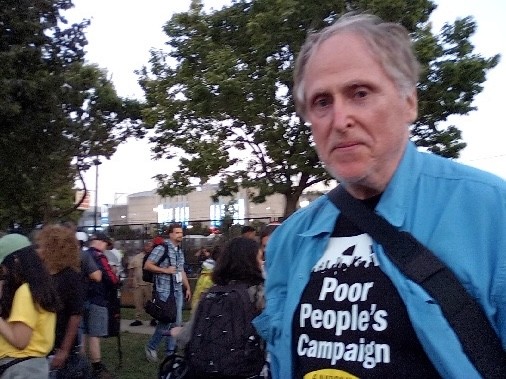
The main body of protest that day was a loose confederation styling itself as the Coalition to March on the DNC. It was a gathering and parade of thousands of people from Union Park to the United Center and back. With the added splash of a few arrests, it of course garnered the most press attention.
I chose instead a much smaller stand-alone cadre of perhaps two hundred: the Poor People’s Army, also known as the Poor People's Economic Human Rights Campaign.
Following remarks from six or eight organizers and leaders, we set off in the late afternoon from Humboldt Park and walked (trudged?) single file for about four miles to the United Center.
Legions of police outnumbered we the protesters. Some were helmeted and with batons; others were on bicycles. They were ahead and alongside and behind us, all moving as if to isolate a contagion.
As I walked, impressions came to me as the flickering of fireflies.
The police? Indifferent. Annoyed. (Flicker.) Nonchalant. Menacing. (Flicker.) Duty bound. Stoic. Angry. Bored. (Flicker, flicker.) Well, at least there’s overtime pay. (Flicker.)
I was particularly taken by a glimpse of perhaps half a dozen convention delegates, each with badges of honor slung about their necks, all emblazoned as Secure and Chosen and Privileged and Democrat.
Leering. Condescending. (Flicker.) Amused. Contemptuous. Smug. (Flicker.) Smirking. Scornful. Mocking. (Flicker, flicker.)
Our procession ended in twilight at a small park adjacent to the outer security perimeter. Unsurprisingly, a large knot of police forbade entry into Fortress Democrat.
Underfoot was the detritus of signage from the earlier, larger rally. No small irony: slogans of support for Palestinians lay trampled and broken on the asphalt and grass.
That was that. We milled about for fifteen or twenty minutes, then became one with the gloaming.
I’m glad that I participated. In my own small way, I tried to lend voice.
Candidate Trump long has been an ambassador to wealth. Candidate Harris now speaks vaguely about supporting the middle class. Neither mentions the deprivations and despair of being poor.
I believe that Lyndon Johnson was on the right track years ago with the War on Poverty.
It should occur to the policymakers of today that there’s a certain calloused wisdom in helping people – all people. Think what you will about the morality and ethics of it all. A healthy and prosperous citizenry means more tax revenue. It also means reduced outlays for health and housing and education.
Poor no more. It’s the right thing to do. It’s the decent thing to do.
And from a public policy standpoint, poor no more also is the smart thing to do.
NOTE: To learn more about the Poor People's March and their statement, click here.